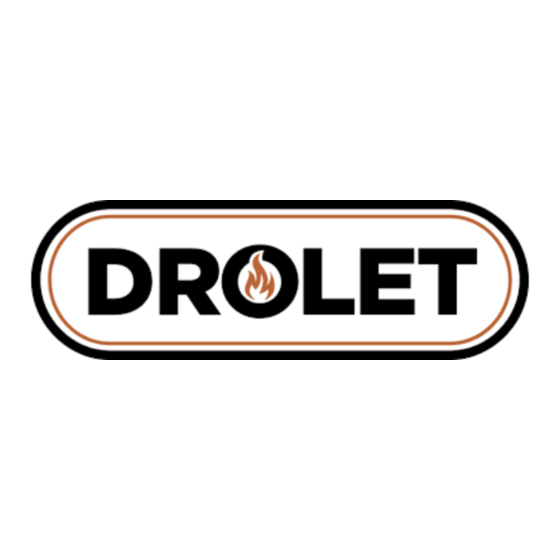
Table of Contents
Advertisement
Quick Links
Advertisement
Table of Contents

Summary of Contents for Drolet ALASKA 2000
- Page 1 INSTALLATION AND OPERATING MANUAL OIL BURNING STOVE ALASKA 2000 Vérified and tested following CAN/CSA B140.3 et UL 896 standards by: Intertek Testing Services Fabricated by: 1700 Léon-Harmel Québec, (Québec) G1N 4R9 READ THESE INSTRUCTIONS AND SAVE FOR REFERENCE 990830/45004A...
-
Page 2: Table Of Contents
TECHNICAL DATA ... 1 INSTALLATION INSTRUCTIONS ... 2 Locating the stove ...2 Chimney informations...3 Connecting the stove to the chimney ...4 Leveling the unit ...5 Fixation of stove to floor ...5 Connecting stove to oil tank ...6 Adjusting the draught ...7 Draught regulator ...7... -
Page 3: Installation Instructions
Figure 1 : CORNER INSTALLATION Figure 3 : WALL INSTALLATION • IMPORTANT: It is essential to ensure that the room were the stove is located is sufficiently ventilated to provide an adequate air supply. • It is possible that if your home is well insulated, that you will have to install an outside fresh air intake. -
Page 4: Chimney Informations
• Before the hook up of the stove, check if the chimney is in good condition and that the quality of the flue will allow a sufficient draught. For a good combustion, refer to the technical data of the stove to know the minimum draught required. -
Page 5: Connecting The Stove To The Chimney
• The gases are vented from he back of the unit. The female part of the black pipe connector has to be installed toward the flue connector of the stove. Secure all connections with the (3) self taping screws, with 120 distance between each of them. -
Page 6: Leveling The Unit
• Now that the stove is in place and properly hooked up to the chimney, you have to adjust the level on the burner. • Put the level in the middle of the burner paralleled to the door. (Figure 9A). Screw or unscrew the adjustable legs to level the burner with a 7/16"... -
Page 7: Connecting Stove To Oil Tank
• Use only caper piping to connect tank to stove. • Make sure that there is a small slope on the connection from the tank toward the stove. • A 3" down slope is needed on the tank itself, from the outlet towards the other end of the tank. -
Page 8: Adjusting The Draught
• Your stove operated with natural draught, created by the ascension of combustion gases in the chimney. This movement creates a siphon effect in the stove and forces ambient air to go in the burner by the holes in its surround. These orifices let air in for combustion. -
Page 9: Operation Instructions
OPERATION INSTRUCTIONS • Your stove has been design to work with oil #1 or #2. DO NOT USE GASOLINE, CRANKCASE OIL OR ANY OIL CONTAINING GASOLINE. Drolet Stoves & Fireplaces declines all responsibility regarding damage cause by using other combustibles. -
Page 10: Changing Intensity
Note : Do not leave matches or other materials in the burner in order to keep it clean. It allows a better combustion. IF YOU MISS THE STOVE’S LIGHTING, ALWAYS WAIT FOR THE BURNER TO COOL DOWN TO ROOM TEMPERATURE BEFORE... -
Page 11: Turning The Stove Off
• Set the flow regulating handle to position 0. • If you plan to keep the stove off for a long while, it is recommended to disarm the valve’s lever and close the tap on the pipe between the stove and your oil tank. (See TOP VIEW above). -
Page 12: Troubleshooting Guide
PROBLEMS ON POSITION 6 (MAXIMUM) THE FLAME IS LONG AND SMOKY, THERE SUIT BUILD UPON THE GLASS ON POSITION 1 (MINIMUM) THE FLAME PRODUCES SMOKE AND SUITS THE GLASS ON POSITION 1 (MINIMUM) THE FLAME PRODUCES SMOKE AND SUITS THE GLASS TROUBLESHOOTING GUIDE CAUSES... - Page 13 Air pocket is stocked in the oil line Oil #2 is used in exterior tank Partial or total obstruction by impurities in oil line or filters The stove has been lit while excess of oil was in the burner Page 12 of 15 SOLUTION 1. Tighten...
-
Page 14: Spare Parts
After years of use, if you need to replace some parts, please contact your SUPPLIER or one of our Drolet approved DEALERS. • Give him product data as displayed in your warranty voucher or on your appliance’s name plate at the rear. - Page 15 Page 14 of 15...
-
Page 16: W A R R A N T Y
All defects or damages caused by the use of parts other than Drolet Stoves & Fireplaces original parts automatically cancels the warranty.














Need help?
Do you have a question about the ALASKA 2000 and is the answer not in the manual?
Questions and answers